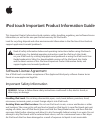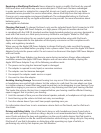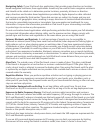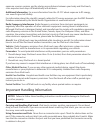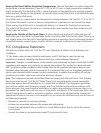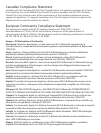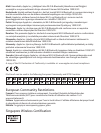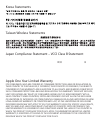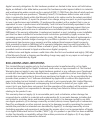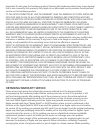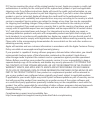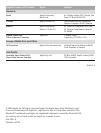Keeping iPod touch Within Acceptable Temperatures Operate iPod touch in a place where the
temperature is always between 0º and 35º C (32º to 95º F). Low- or high-temperature conditions
might temporarily shorten battery life or cause iPod touch to temporarily stop working properly.
Avoid dramatic changes in temperature or humidity when using iPod touch as condensation may
form on or within iPod touch.
Store iPod touch in a place where the temperature is always between -20º and 45º C (-4º to 113º F).
Don’t leave iPod touch in your car, because temperatures in parked cars can exceed this range.
When you’re using iPod touch or charging the battery, it is normal for iPod touch to get warm.
The exterior of iPod touch functions as a cooling surface that transfers heat from inside the unit
to the cooler air outside.
Keeping the Outside of iPod touch Clean To clean iPod touch, unplug all cables and turn o
iPod touch (press and hold the Sleep/Wake button, and then slide the onscreen slider). Then use a
soft, slightly damp, lint-free cloth. Avoid getting moisture in openings. Don’t use window cleaners,
household cleaners, aerosol sprays, solvents, alcohol, ammonia, or abrasives to clean iPod touch.
FCC Compliance Statement
This device complies with part 15 of the FCC rules. Operation is subject to the following two
conditions:
(1) This device may not cause harmful interference, and (2) this device must accept any
interference received, including interference that may cause undesired operation.
Important: Changes or modications to this product not authorized by Apple could void the EMC
compliance and negate your authority to operate the product. This product has demonstrated
EMC compliance under conditions that included the use of compliant peripheral devices and
shielded cables between system components. It is important that you use compliant peripheral
devices and shielded cables between system components to reduce the possibility of causing
interference to radios, televisions, and other electronic devices.
Note: This equipment has been tested and found to comply with the limits for a Class B digital
device, pursuant to part 15 of the FCC Rules. These limits are designed to provide reasonable
protection against harmful interference in a residential installation. This equipment generates,
uses and can radiate radio frequency energy and, if not installed and used in accordance with
the instructions, may cause harmful interference to radio communications. However, there is no
guarantee that interference will not occur in a particular installation. If this equipment does cause
harmful interference to radio or television reception, which can be determined by turning the
equipment o and on, the user is encouraged to try to correct the interference by one or more of
the following measures:
Reorient or relocate the receiving antenna.•
Increase the separation between the equipment and receiver.•
Connect the equipment into an outlet on a circuit dierent from that to which the receiver •
is connected.
Consult the dealer or an experienced radio/TV technician for help.•



